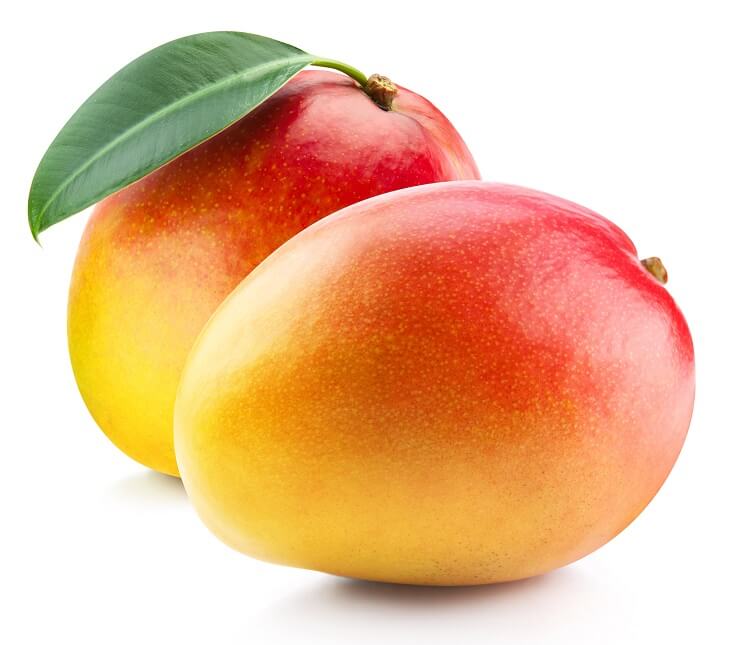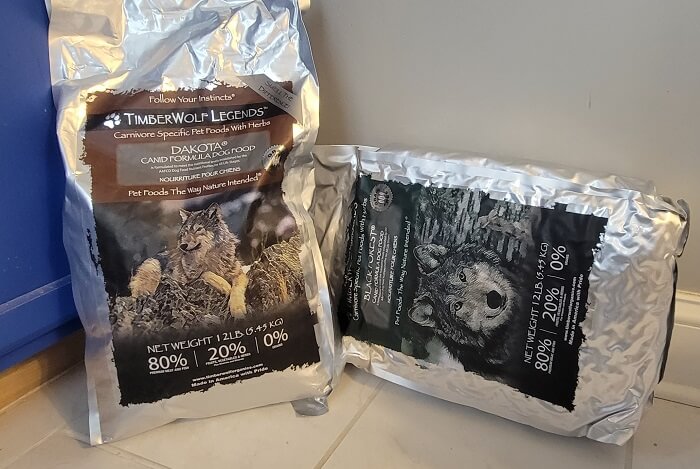Can Dogs Eat Mangos?
This page contains affiliate links. We may earn money or products from the companies mentioned in this post through our independently chosen links, which earn us a commission. Learn More

Many dogs love fruit but not all fruit is good for dogs. Some fruits can even be toxic to dogs. That’s why it’s always good to check before you give your dog something for the first time.
In the case of mangos (or mangoes – both are correct), if you’re wondering, “Can dogs eat mangos?” the answer is mostly yes.
Not all parts of the mango are safe for dogs but the sweet, soft flesh of the mango is safe.
Learn more about mangos and what parts are safe – and not safe – to give your dog in our short guide.
Mango Nutrition Stats
One cup of sliced raw mangos is considered to be a serving size for a human. It contains 165 grams.
- Calories: 107 (5% daily value)
- Protein: 0.8 g (2% daily value)
- Carbohydrates: 28.1 g (9% daily value)
- Fat: 0.4 g (1% daily value)
- Fiber: 3.0 g (12% daily value)
- Vitamin A: 1262 IU (25% daily value)
- Vitamin C: 45.7 mg (76% daily value)
- Vitamin E (Alpha Tocopherol): 1.8 mg (9% daily value)
- Vitamin K: 6.9 mcg (9% daily value)
- Manganese: 0.0 mg (2% daily value)
- Vitamin B6: 0.2 mg (11% daily value)
- Phosphorus: 18.2 mg (2% daily value)
- Copper: 0.2 mg (9% daily value)
- Sodium: 3.3 mg (0% daily value)
- Zinc: 0.1 mg (0% daily value)
- Selenium: 1.0 mcg (1% daily value)
- Thiamin: 0.1% mg (6% daily value)
- Folate: 23.1 mcg (6% daily value)
- Sugars: 24.4g
- Potassium: 257 mg (7% daily value)
- Calcium: 16.5 mg (2% daily value)
- Magnesium: 14.8 mg (4% daily value)
- Niacin: 1.0 mg (5% daily value)
- Pantothenic acid: 0.3% mg (3% daily value)
- Riboflavin: 0.1 mg (6% daily value)
- Iron: 0.2 mg (1% daily value)
Mangos are higher in fiber than many other fruits.
Mango Nutritional Facts At A Glance

Mangos are one of the most nutritious fruits. They are very high in vitamin C and vitamin A. They are also a very good source of dietary fiber and vitamin B6.
In addition, they provide notable amounts of many other vitamins and minerals such as vitamin E, vitamin K, folate, and copper. These nutrients are believed to boost the immune system.
Mangos contain small amounts of phosphorus, pantothenic acid, calcium, selenium, and iron.
Overall, mangos are made up of 95 percent carbohydrates, 3 percent fats, and 2 percent protein. They are low in calories. One cup of sliced mangos contains about 107 calories.
This fruit is also high in polyphenols that act as antioxidants. Mangos contain more than a dozen different kinds of polyphenols such as mangiferin, catechins, anthocyanins, quercetin, kaempferol, rhamnetin, benzoic acid and more.
Mangiferin, in particular, has garnered attention as a “super antioxidant,” suggesting that it can counter damage from free radicals involved with cancer, diabetes, and other health problems. Some sources suggest that the mangiferin in mangos can aid in heart health.
The water content and fiber in mangos can help with digestive tract issues such as constipation and diarrhea. Mangos also contain digestive enzymes called amylases which break down carbohydrates into simpler sugars such as glucose and maltose, making digestion easier.
Other antioxidnts found in mangos, such as lutein and zeaxanthin, are believed to help with eye health. Inside the retina of the eye they act as a natural sunblock, absorbing excess light and protecting the eyes from harmful blue light. As a good source of vitamin A, which supports eye health, mangos could help prevent dry eyes and nighttime blindness.
As a good source of vitamin C, mangos can be good for skin and hair health. Vitamin C is necessary for the body to produce collagen – the protein that gives your skin and hair structure and gives your skin its elasticity. Collagen prevents wrinkles and sagging. The vitamin A in mangos also encourages the production of sebum.
Sebum is the liquid that moisturizes your scalp and keeps your hair healthy. Vitamin A and other retinoids also provide a cover for your skin to keep it healthy. Finally, the antioxidants in mangos can protect hair follicles against oxidative stress.
On the down side, like many fruits, a large portion of the calories in mangos come from natural sugars. The sugar content in mangos is higher than the sugar found in many other tropical fruits.
Can Dogs Eat Mangos?
Yes, dogs can eat mangos, but only the soft interior fruit. Mangos have a tough outer skin and they contain a pit or stone in the center. The tough skin is not only hard to cut but it would be very hard for many dogs to try to digest. While it is technically edible, most dogs would have problems with it.
The pit of a mango is a choking hazard. If your dog eats it he could choke on it; or it could lead to an intestinal blockage if consumed. Like apple seeds, the mango pit also contains a cyanide compound which is toxic to dogs in large quantities.
For these reasons you should not give your dog a whole mango to eat. Always peel and slice a mango for your dog to remove the outer skin and the pit.
Mangos are sweeter and higher in sugar than many other fruits so it’s best not to give your dog too much mango at one time.
Are Mangos Good for Dogs?
Yes, mangos are good for dogs to eat. There are over 4000 varieties of mangos. They are versatile, tasty, and easy to prepare. They can be hard to cut because of the mango skin but no worse than some other fruits with tough outer skins.
With vitamins A, B6, C, and E, as well as many minerals, mangos are quite nutritious.
Mangos do contain a lot of fiber – more than some dogs are used to. For this reason, eating too much mango can lead to an upset stomach or diarrhea.
Eating too much mango too often (or other sweet fruits) can also be bad for your dog’s teeth. Dogs can have problems with sugar and dental decay just like people. This is another reason to give mangos in moderation.
If your dog is overweight or diabetic, there are other fruits and vegetables that you can give as treats which don’t contain as much sugar. Consult your veterinarian.
How Much Mango Can Dogs Eat?

The rule of thumb for any treat that you give your dog is that it shouldn’t make up more than 10 percent of your dog’s daily calories. One cup of raw, sliced mango fruit contains about 100 calories.
If your adult dog weighs about 30 pounds, he would need roughly 800 calories per day. He could eat a little less than a cup of sliced mangos as treats, provided he was accustomed to the fruit and it didn’t cause any digestive upset.
How Often Can Dogs Eat Mangos?
Remember that mangos are high in sugar and dietary fiber. Even if your dog loves them, it’s best not to give them to your dog frequently. Once or twice per week would be plenty.
You can alternate the mango with other fruits and vegetables that don’t contain as much sugar.
The Correct Diet Is Important
Dogs need to eat the correct diet for good health. All dogs need good quality protein and fat appropriate for their age, lifestyle, and health condition in order to thrive.
Most healthy dogs need the following things in their diet:
- Good Sources of Protein- Meat, fish, poultry, and eggs are all good sources of animal protein. Animal protein is generally easier for dogs to digest. The more accurately the protein is identified on the label, the better.
- Good Sources of Fat- Fat provides essential fatty acids (EFA) and helps distribute the fat soluble vitamins A, D, E, and K so your dog can absorb them easily.
- Named Ingredients- Named ingredients are usually better than generic ingredients. The more specific, the better, so you know precisely what your dog is eating.
- Low to Moderate Carbohydrates- Most experts recommend diets that contain low to moderate amounts of carbohydrates. Carbohydrates are not “bad” for dogs but they should not be used as a substitute for protein. Many carbs do double duty as dietary fiber and probiotics.
- Avoid Artificial Preservatives, Colors, and Sweeteners- Artificial preservatives and colors/dyes have been linked to some health problems in humans and animals. You should try to avoid these ingredients in dog foods.
- AAFCO- AAFCO is the Association of American Feed Control Officials. AAFCO sets voluntary standards for pet food labeling. Look for foods that have these minimum standards.
- Fresh Water- All dogs need access to fresh water unless they are ill or have some other reason to be temporarily kept away from water. For example, if you are house training your puppy, you can safely put away water overnight.
If your dog has health problems of any kind, please see a veterinarian for dietary advice. Regular diets may need to be adjusted. Your dog may not be able to eat some fruits and vegetables so ask your vet.
What Are Other Healthy Alternatives to Mangos In A Dog’s Diet?

Mangos make a great snack for your dog but there are many other healthy foods you can give your dog in small amounts.
You should consider these human foods as healthy snacks. Check with your veterinarian if your dog has any health issues and you are concerned about giving any of these foods.
Remember that not all parts of a fruit or vegetable are safe for dogs in some cases.
- Apples
- Asparagus
- Avocados
- Bananas
- Bell pepper
- Broccoli
- Brussels sprouts
- Carrots
- Cauliflower
- Cucumbers
- Green beans
- Oranges
- Parsnip
- Pears
- Pineapple
- Pumpkin
- Strawberries
- Summer squash
- Sweet potato
- Tomatoes
- Watermelon
- Zucchini
How Do You Give Your Dog Mangos?
The easiest way to give your dog fruit from a mango is to peel it, remove the pit, and cut the fruit in small slices or chunks. NEVER let your dog have the stone or pit from the mango. It is a potential choking hazard.
You can also serve the mango flesh to your dog frozen. Frozen mango is especially fun and tasty as a treat when it’s hot during the summer months.
Some people like to add mango fruit to yogurt smoothies for their dogs. Freezing the mango smoothie mixture into ice cube trays makes a great tasty treat for your dog to lick and enjoy later.
Conclusion
Mango is not just delicious, it’s also rich in vitamins, minerals, and antioxidants. It’s believed to provide many health benefits and can potentially boost immunity to help fight cancer, help the digestive system, and fight off other diseases.








